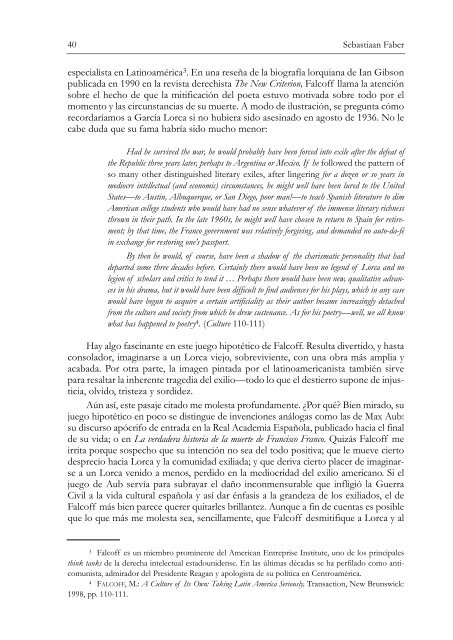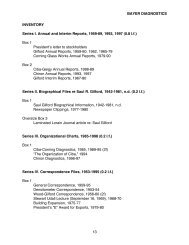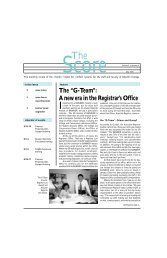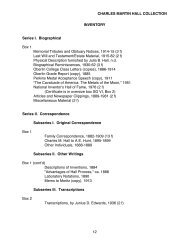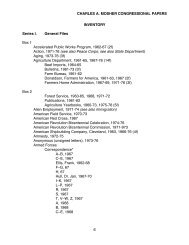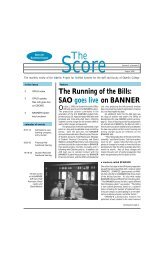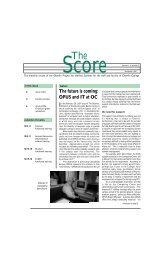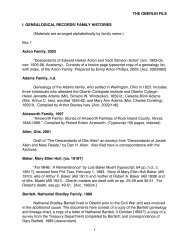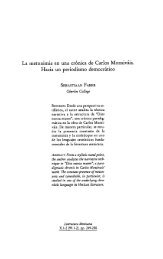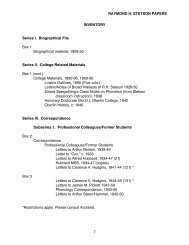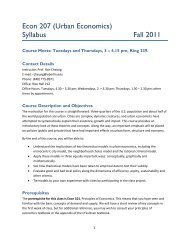Entre el respeto y la crÃtica. Reflexiones sobre la ... - Oberlin College
Entre el respeto y la crÃtica. Reflexiones sobre la ... - Oberlin College
Entre el respeto y la crÃtica. Reflexiones sobre la ... - Oberlin College
You also want an ePaper? Increase the reach of your titles
YUMPU automatically turns print PDFs into web optimized ePapers that Google loves.
40 Sebastiaan Faber<br />
especialista en Latinoamérica 3 . En una reseña de <strong>la</strong> biografía lorquiana de Ian Gibson<br />
publicada en 1990 en <strong>la</strong> revista derechista The New Criterion, Falcoff l<strong>la</strong>ma <strong>la</strong> atención<br />
<strong>sobre</strong> <strong>el</strong> hecho de que <strong>la</strong> mitificación d<strong>el</strong> poeta estuvo motivada <strong>sobre</strong> todo por <strong>el</strong><br />
momento y <strong>la</strong>s circunstancias de su muerte. A modo de ilustración, se pregunta cómo<br />
recordaríamos a García Lorca si no hubiera sido asesinado en agosto de 1936. No le<br />
cabe duda que su fama habría sido mucho menor:<br />
Had he survived the war, he would probably have been forced into exile after the defeat of<br />
the Republic three years <strong>la</strong>ter, perhaps to Argentina or Mexico. If he followed the pattern of<br />
so many other distinguished literary exiles, after lingering for a dozen or so years in<br />
mediocre int<strong>el</strong>lectual (and economic) circumstances, he might w<strong>el</strong>l have been lured to the United<br />
States—to Austin, Albuquerque, or San Diego, poor man!—to teach Spanish literature to dim<br />
American college students who would have had no sense whatever of the immense literary richness<br />
thrown in their path. In the <strong>la</strong>te 1960s, he might w<strong>el</strong>l have chosen to return to Spain for retirement;<br />
by that time, the Franco government was r<strong>el</strong>ativ<strong>el</strong>y forgiving, and demanded no auto-da-fé<br />
in exchange for restoring one’s passport.<br />
By then he would, of course, have been a shadow of the charismatic personality that had<br />
departed some three decades before. Certainly there would have been no legend of Lorca and no<br />
legion of scho<strong>la</strong>rs and critics to tend it … Perhaps there would have been new, qualitative advances<br />
in his drama, but it would have been difficult to find audiences for his p<strong>la</strong>ys, which in any case<br />
would have begun to acquire a certain artificiality as their author became increasingly detached<br />
from the culture and society from which he drew sustenance. As for his poetry—w<strong>el</strong>l, we all know<br />
what has happened to poetry 4 . (Culture 110-111)<br />
Hay algo fascinante en este juego hipotético de Falcoff. Resulta divertido, y hasta<br />
conso<strong>la</strong>dor, imaginarse a un Lorca viejo, <strong>sobre</strong>viviente, con una obra más amplia y<br />
acabada. Por otra parte, <strong>la</strong> imagen pintada por <strong>el</strong> <strong>la</strong>tinoamericanista también sirve<br />
para resaltar <strong>la</strong> inherente tragedia d<strong>el</strong> exilio—todo lo que <strong>el</strong> destierro supone de injusticia,<br />
olvido, tristeza y sordidez.<br />
Aún así, este pasaje citado me molesta profundamente. ¿Por qué? Bien mirado, su<br />
juego hipotético en poco se distingue de invenciones análogas como <strong>la</strong>s de Max Aub:<br />
su discurso apócrifo de entrada en <strong>la</strong> Real Academia Españo<strong>la</strong>, publicado hacia <strong>el</strong> final<br />
de su vida; o en La verdadera historia de <strong>la</strong> muerte de Francisco Franco. Quizás Falcoff me<br />
irrita porque sospecho que su intención no sea d<strong>el</strong> todo positiva; que le mueve cierto<br />
desprecio hacia Lorca y <strong>la</strong> comunidad exiliada; y que deriva cierto p<strong>la</strong>cer de imaginarse<br />
a un Lorca venido a menos, perdido en <strong>la</strong> mediocridad d<strong>el</strong> exilio americano. Si <strong>el</strong><br />
juego de Aub servía para subrayar <strong>el</strong> daño inconmensurable que infligió <strong>la</strong> Guerra<br />
Civil a <strong>la</strong> vida cultural españo<strong>la</strong> y así dar énfasis a <strong>la</strong> grandeza de los exiliados, <strong>el</strong> de<br />
Falcoff más bien parece querer quitarles bril<strong>la</strong>ntez. Aunque a fin de cuentas es posible<br />
que lo que más me molesta sea, sencil<strong>la</strong>mente, que Falcoff desmitifique a Lorca y al<br />
03 Falcoff es un miembro prominente d<strong>el</strong> American <strong>Entre</strong>prise Institute, uno de los principales<br />
think tanks de <strong>la</strong> derecha int<strong>el</strong>ectual estadounidense. En <strong>la</strong>s últimas décadas se ha perfi<strong>la</strong>do como anticomunista,<br />
admirador d<strong>el</strong> Presidente Reagan y apologista de su política en Centroamérica.<br />
04 FALCOFF, M.: A Culture of Its Own: Taking Latin America Seriously, Transaction, New Brunswick:<br />
1998, pp. 110-111.


